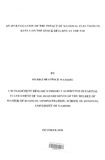An investigation of the impact of national elections in Kenya on the stock returns at the NSE

View/
Date
2009Author
Murigi, Beatrice W
Type
ThesisLanguage
enMetadata
Show full item recordAbstract
This study was carried out to establish the impact of national elections in Kenya on the
stock returns at NSE. The objective of the study was to investigate the effect of
elections in Kenya on the returns of stocks in the various segments of the NSE market.
This was to be obtained by computing abnormal returns of the market segments during
three election years i.e. 1997, 2002 and 2007.
At the introduction level, various issues were addressed such as the origin of the NSE,
which is believed to have started way back in the 1920s during the British colony. The
importance of the study was deemed to be relevant to various categories of people
including but not limited to: Investors, Brokerage firms, future researchers and
academicians to the academic literature, listed companies, and Government and Quasi
government bodies.
The literature review explored other related studies such as: the theories that tries to
explain the behavior of stock market returns during an election period e.g. political
business cycle theory, partisan theory of economic policy, randomness of security price
changes and efficient markets hypothesis. Factors such as Demand and supply of
shares in the stock market, News related to a company, Market capitalization of the
company, Earnings per Share and Price/ Earnings Ratio were identified as those
responsible for change in sock prices.
Secondary data was collected from NSE and data vendors. The same was analyzed
using statistical packages for social sciences and the findings were interpreted. The
findings indicated that the abnormal returns are positive before an election takes place
and become negative thereafter. This applies to 1997 and 2002 election year. In 2007
election year the abnormal returns remained positive before and after the election.
A summary of the findings was done and various recommendations made both for
further study and policy formulation. Some of the limitations to the study were also
identified and noted in the last chapter.
Publisher
University of Nairobi
Description
MBA Thesis
